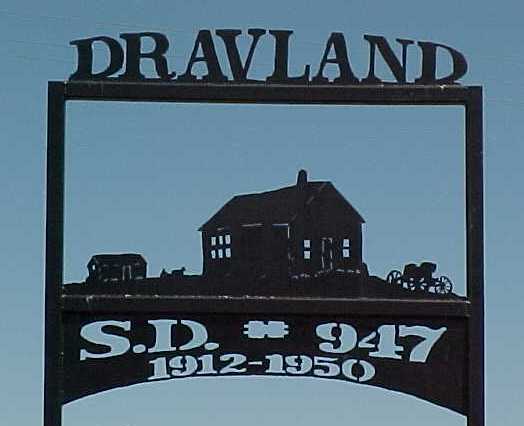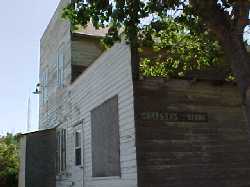|
|
|
|
|
|
By Rich Verman of Toronto
river at rogers.comAugust 2001
When I was young I thought Saskatchewan was magical. With more syllables than any other word I knew in those years even the name sounded like magic. It was a mythical place where kids rode horses on a wild and untamed prairie and had adventures that my imagination had stolen from episodes of Bonanza.
 In the Dravland School District number 947, 100 kilometers south of Weyburn, the Sonnenfeld colony was established in 1906, although it was not named such until several years later. By 1912, the colony had completed the building a synagogue on a section of land which twelve years became the farm of my grandparents, Samuel and Rose Verman. The synagogue served not only as a place of worship, but as the main social and communal gathering place of the colony. Holidays, simchas [Jewish life cycle celebrations], funeral services, dances and games were held at the synagogue throughout the year and in all kinds of weather.
In the Dravland School District number 947, 100 kilometers south of Weyburn, the Sonnenfeld colony was established in 1906, although it was not named such until several years later. By 1912, the colony had completed the building a synagogue on a section of land which twelve years became the farm of my grandparents, Samuel and Rose Verman. The synagogue served not only as a place of worship, but as the main social and communal gathering place of the colony. Holidays, simchas [Jewish life cycle celebrations], funeral services, dances and games were held at the synagogue throughout the year and in all kinds of weather.
People apparently travelled for many miles to attend dances and social events. I had often heard my father and his siblings talk about how people would sleep on the floor of their house and share their food and drink until the weather had cleared enough for the visitors to return home. Like the shepherds and farmers of biblical times who gathered near Jerusalem to celebrate the end of the harvest season, the colonists also gathered to celebrate and worship in freedom.
In 1924, the colony well established, the fields mostly broken but not yet cleared of stones, my father Moishe, his siblings Saul, Clara, Irving and Bessie and their parents arrived with the assistance of the Baron de Hirsch Society and the Jewish Colonization Association. From the pogroms in the village of Miskawka in Czarist Russia, to their arrival in Tribune, Saskatchewan, they journeyed for over two years.
As harsh and barren as the prairie landscape was on that cold February day in 1924, the taste of the freedom they experienced must have made it seem the sweetest place on earth.
Life was hard. At first it was a struggle just to survive. Perhaps due to necessity, or perhaps out of some socialist spirit that the eastern papers alluded to, all of the families helped each other. The men traveled from farm to farm at harvest time to bring in the crops. Because no individual family possessed the resources to complete the job themselves, livestock, machinery and back-breaking labour were pooled so that each family farm could reap its harvest and prepare to endure another winter.
 The necessities of life could be purchased, or ordered from Hoffer's grocery in Hoffer, Chapman's store in Oungre and Altman's Clothing and Post Office in Ratcliffe. Bills were settled after harvest. Today all of these busy little hamlets are deserted and forlorn. In 1952, as the synagogue sat abandoned, the Torah scrolls [the Jewish Bible, or five books of Moses, hand scribed on parchment] were gathered and sent to a struggling kibbutz [collective farm colony] in Israel and the old siddurim [Jewish prayer books] were buried in the Jewish cemetery in Regina.
The necessities of life could be purchased, or ordered from Hoffer's grocery in Hoffer, Chapman's store in Oungre and Altman's Clothing and Post Office in Ratcliffe. Bills were settled after harvest. Today all of these busy little hamlets are deserted and forlorn. In 1952, as the synagogue sat abandoned, the Torah scrolls [the Jewish Bible, or five books of Moses, hand scribed on parchment] were gathered and sent to a struggling kibbutz [collective farm colony] in Israel and the old siddurim [Jewish prayer books] were buried in the Jewish cemetery in Regina.
Life for the Jewish settlers of the Canadian west was unfortunately not as exciting nor as carefree as I had imagined in my youth. They were a creative and not surprisingly, a headstrong group. It took a depression, a world war, a ten-year drought, prairie fires, and biblical plagues of locusts, hail storms and pestilence to force the colony's youth off the farms and into the cities and the life of the twentieth century.
In August 2001, sixty-two years after my father left his family farm for the mean streets of Toronto, the capitals of war torn Europe, and eventually the liberation of Dachau concentration camp, I brought my family back. My wife, children, mother and my cousin Adele (nee Bronstein), who was born in the colony, came back to the fields that shaped my father's early years and formed the backdrop to the legends of my youth. We ran on the fields the previous generations toiled so hard upon, found the foundations to the old school where they learned about their new country, and felt and listened to the same wind that cooled their brows as they toiled in their new found freedom.
|
|
|
|
|
|
